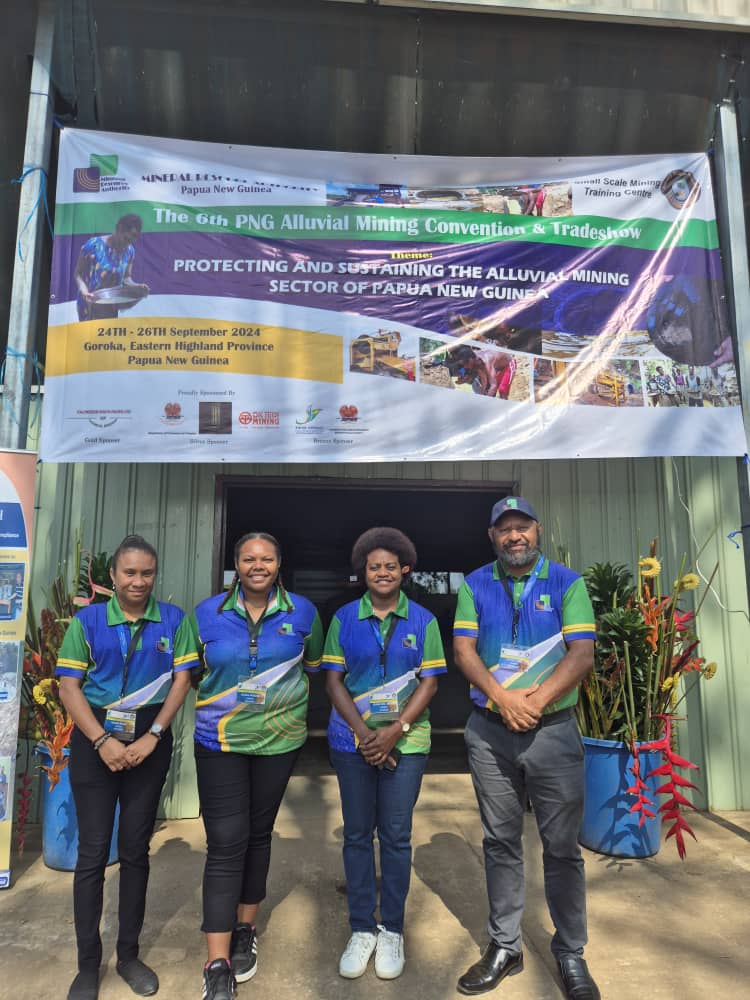PNG Extractive Industries Transparency Initiative has called for an ongoing dialogue and collaboration among all stakeholders in the alluvial mining sector.PNGEITI believes that collaboration among stakeholders is necessary to address pressing issues such as non-compliance, under-reporting the quantity of minerals produced and environmental concerns among other challenges faced in the alluvial mining sector. This follows the recent 6th PNG Alluvial Mining Convention and tradeshow in Goroka, Eastern Highlands from 24th to the 26th of September.
PNGEITI participation in the three day event was driven by key objectivities.
- Industry Development: Enhancing relationships through ongoing dialogue and collaboration with all stakeholders.
- Legislative and Policy Framework: Identifying gaps and opportunities within the existing legal and policy framework to bolster EITI processes, and increase transparency and accountability in the alluvial mining sector.
- Insight Gathering: Addressing pressing issues such as non-compliance and under-reporting in alluvial mining operations, gold smuggling, environmental concerns, and challenges faced by local landowners.
The event generated discussions on various topics, including the challenges in alluvial mining legislation, mechanized mining operations, and the market value chain of alluvial gold in Papua New Guinea. The bi-annual event convened key stakeholders in the alluvial mining sector to discuss critical issues, share insights, and forge stronger collaborations aimed at ensuring the sustainability of this vital sector for the country. The 2024 convention’s theme, “Protecting & Sustaining the Alluvial Mining Sector of Papua New Guinea,” called for a collective commitment to bolster the development and longevity of the sector, which provides a crucial source of livelihood for many local communities. PNGEITI took note of the discussions especially on production data discrepancies, monitoring and regulation of gold exports, and the need for stronger government support to protect the interests of local miners. Register of Tenements with Mineral Resource Authority, Stanley Nekitel in his presentation described the industry as a “Grassroots Economic Sector” whilst expressing his concern over the drop in production levels despite rising global gold prices. Oro Governor, Garry Juffa highlighted a concerning on what he described as a contradiction between the increase in alluvial mining activities and the reported decline in gold production data. He called for immediate government intervention to address gaps in monitoring, reporting, and creating policies that safeguard the interests of Papua New Guineans in the sector. Industry representatives, Justine Parker of Tribal Mining Limited and Raymond Wally, leaseholder and tributer, raised critical concerns about the impact of foreign investments, money laundering activities, and the need for financial capacity building for local landowners. Their inputs emphasized the importance of equitable benefit-sharing among all stakeholders in the sector. The key highlight of the event was the launch of the Resource Evaluation Code of Practice (RECP), developed in partnership with the PNG University of Technology. This code aims to standardize responsible and sustainable mining practices across the alluvial mining sector, addressing long-standing issues with environmental sustainability and operational transparency.





